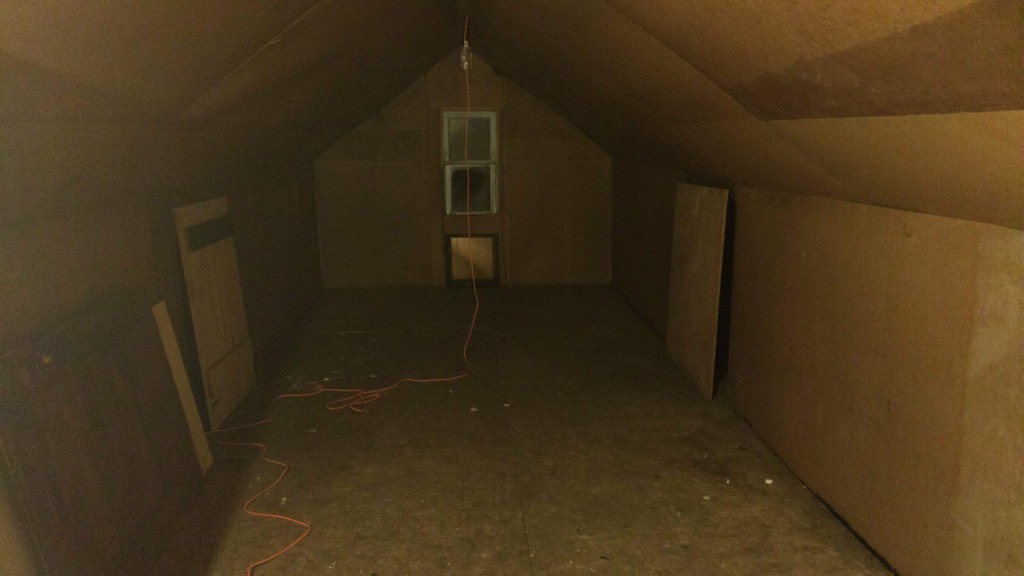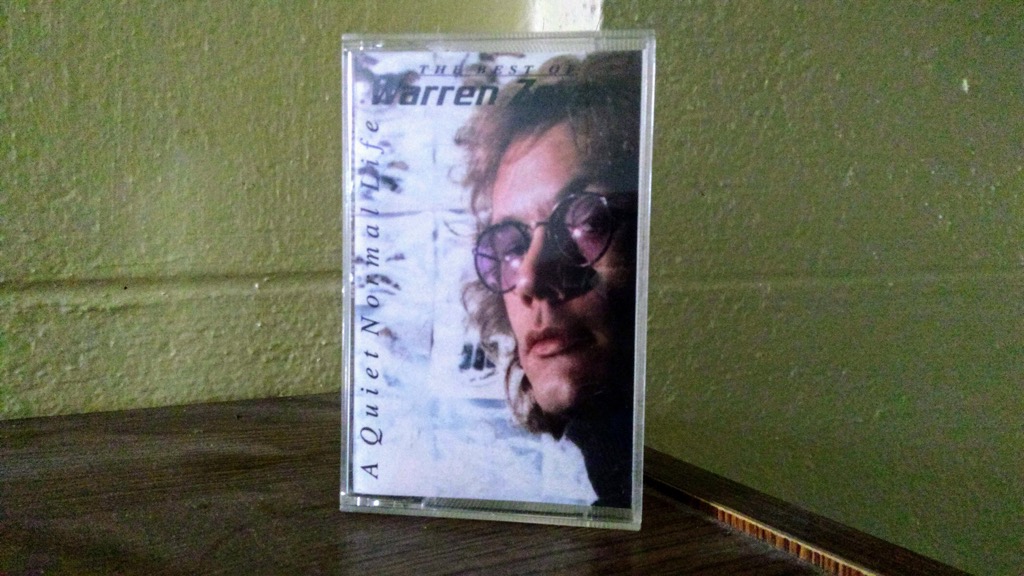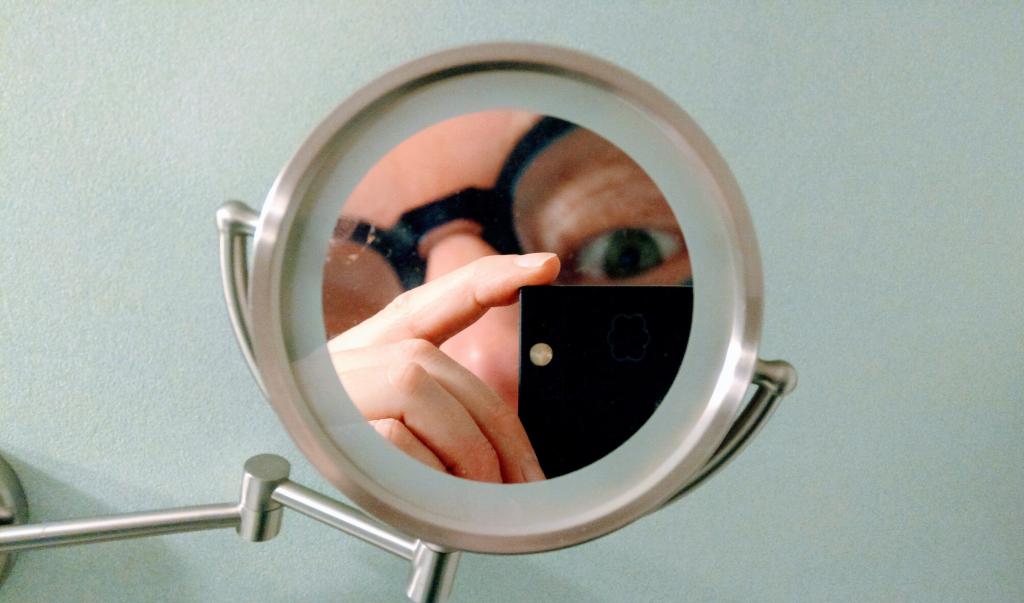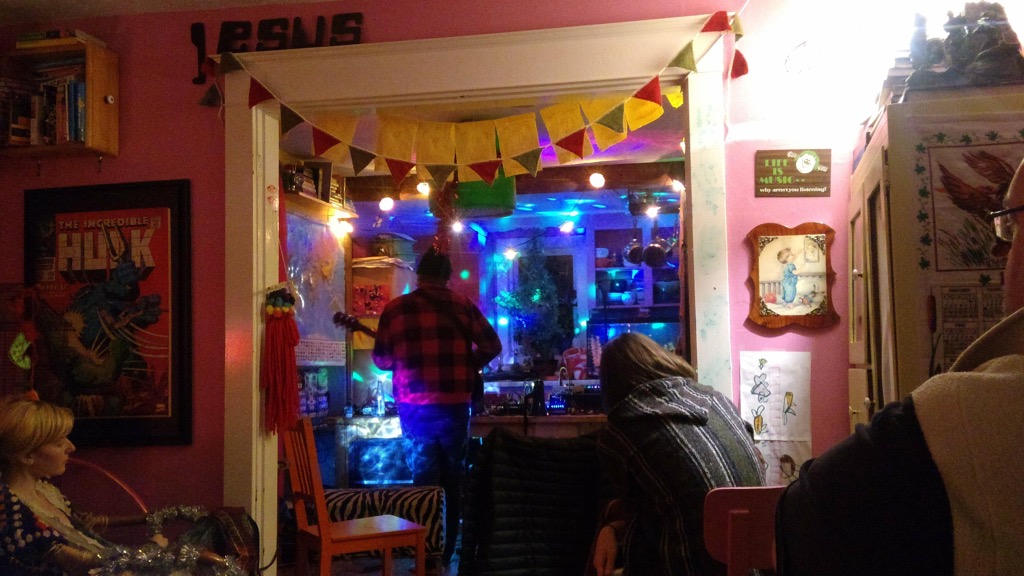Watching these videos of “School Food Think Tanks” held this fall made me so happy:
- East Wiltshire School Food Think Tank
- Kinkora School Food Think Tank
- Montague Regional High School Food Think Tank
Providing all PEI public school students with free, locally-produced healthy food every day seems evermore like it will soon be a reality; kudos to all those involved in pushing this forward.
Chili Infused Raw Honey from Forty Six° North in Murray Harbour. Available at Riverview Country Market (if there’s a business that deserves the 46° in its name, it’s this one: the latitude line runs 300 m south of their kitchen). The honey packs a delightful wallop, but it’s not overpowering. While you’re at Riverview, check out their expanded selection of items for the vegetarian in the cooler, including several varieties of tempeh.
Fox Tea Cosy from Lady Baker’s Tea. Available from their stand at the Charlottetown Farmer’s Market, or from their tea studio in the basement of the Kirk of St. James Hall. They also sell very good tea.
Speaking of tea, I became quite fond this summer of the PEI Preserve Company’s Fitness Tea, a Rooibos tea with verbena, lemongrass, blackberry leaves, balm herb, sunflower blossoms, liquorice root, and cornflower petals. The shop in New Glasgow is open until December 22.
Platinum Preppy Fountain Pen from The Bookmark. In inexpensive entrée into the world of writing as it was meant to be, the Preppy is one of my favourite pens. It’s available with a variety of ink colours and nibs.
Brìgh Music & Tea is, sadly, closing in January. They have a big sale on right now, with prices up to 60% off. Ukuleles and other instruments, books, CDs. And a hot cup of good tea and a chat while you shop.
My friend Perry Williams told me the story of how ADL butter is made by a small multi-skilled team at the dairy in O’Leary; I was a fan of the butter before and I’m even more so now. If you cannot conscience giving someone butter for Christmas, Purity Dairy here in Charlottetown has lovely hats with the Purity logo embroidered on them, perfect for the dairy lover in your family. And they also sell ADL butter.
Receiver Coffee Brass Shop is selling Urnex Coffee Grinder Cleaning Tablets that did a great job breathing new life into our Baratza coffee grinder, allowing us to grind for espresso again.
Three years after we moved into our house at 100 Prince Street we got an ominous letter from a firm handling the “prophylactic bankruptcy” of W.R. Grace, a U.S. company that made vermiculite insulation. The industrious previous owners of our house had, in the 1970s, insulated the attic of the house with vermiculite, no doubt in reaction to the energy crisis of the era and perhaps with government financial assistance.
What they didn’t know at the time was that the vermiculite they were insulating with came from the Libby Mine in Montana and that it contained asbestos. The notice we received was to inform us of this, and to let us know that we might be eligible for compensation to have the asbestos-containing insulation removed.
Unfortunately, it turned out that although claim payments in the United States were generous, and homeowners could get a good part of the cost of removing the insulation covered, in Canada there was much less available: $600 was the figure reported by the Toronto Star in 2009.
We were left with a choice: leave the insulation in place–which is okay, as long as it’s not disturbed–or bear the cost of having it removed.
It took us about a decade to decide what to do, and then, in 2015 when we got a quote for $12,000 to have the insulation removed, we decided to wait even longer.
Finally, this year, things came to a head: our roof started to leak, we got a new roof put on, and we wanted to address the historical issue of ice dams forming, which would damage it (and consume my time with roof-raking).
But to prevent ice dams meant we needed to insulate the attic, and to insulate the attic we needed to remove the old insulation.
I got another quote for vermiculite removal this fall, and this time it was $13,000.
We didn’t have $13,000 to spend, and so I started a deep dive into the world of asbestos remediation contractors in Atlantic Canada, starting from this list from the Workers Compensation Board.
I found a company in Halifax that would come over for $4,200 plus travel and accommodation; this was better, but still more than we had to spend, and with a question mark over what the travel expenses would be.
I kept looking.
After talking to a lot of people on the Island about possible other options, I was referred to Jason Maddix from Maddix Contracting in Wellington. Jason came recommended from several sources I trust, so I gave him a call and a few days later he came for a look; his quote for removing the insulation and re-insulating the attic with 12 inches of blown insulation, was $2,650.
“Do it,” was our reply.
Which then precipitated a need to remove everything from our attic. And in this case “everything” meant cardboard boxes from Oliver’s childhood toys, things we never unpacked from our 2000 move into the house, myriad computer manuals from the 1990s (Turbo Pascal, etc.), two old PCs, an Apple QuickTake camera, Christmas decorations, cassette tapes, CDs, and all manner of cruft that we have no need for but could never mount the energy to clean out. Now we had no choice.
We filled two twelve cubic foot dumpsters with the things that we didn’t need any longer and that weren’t salvageable (and, time being of the essence, I set a very, very low bar for that). The dumpster-filling was made much easier by the position of the dumpster immediately below the window at the end of the attic: I was able to heave almost everything out that window that needed to be removed, something of a miracle as it’s a pretty tiny window.
It took me three days to get everything out, and when I was done here’s what it looked like:

I got a call from Jason last Monday telling me he was ready to start on Wednesday, so Wednesday morning we cleared out of the house (not so much from the hazard, as the asbestos was to be contained to the attic, as to mitigate the disruption to family life) and decamped to the Charlottetown Hotel. Jason and his crew arrived at exactly 9:30 a.m. as promised and worked through the day on Wednesday and Thursday morning to remove the insulation. They got an air clearance test done from ALL-TECH, and then blew in the insulation on Thursday afternoon, finishing up around suppertime.
The finished attic looks like this:

Because we weren’t content to leave the complexity of the job at that alone, we simultaneously arranged to have the ceiling in one of the upstairs bedrooms repaired at the same time (it suffered water damage from the roof leak, that roof leak that was the reason for everything that followed).
While Jason’s crew did a remarkable job cleaning up after themselves, the end effect of the two weeks of construction activity was to leave the house in quite a state, and so I spent a good part of Friday and Saturday restoring order to the household. A new vacuum cleaner was secured, a dozen loads of dusty laundry completed, the remaining detritus from the attic moved into out of the way corners of the house. I put the last load in the dryer at midnight last night and fell fast asleep almost immediately.
If you happen to find yourself in a similar situation, needing asbestos removed from your house and unwilling to sell you firstborn child to pay for it, I heartily recommend Jason: he was quick to communicate, arrived when he said he would, did the job as specified, and was out the door in exactly the time he estimated he would be.
After a new driveway, a new roof, a upstairs toilet leaking into the kitchen ceiling in late summer, and now this, I hope we are done with 100 Prince Street infrastructure work for the foreseeable future. We need a break!
Of the scores of tapes and CDs that went into the dumpster, I saved one A Quiet Normal Life: The Best of Warren Zevon, his 1986 album. Our vintage 2000 VW Jetta has a cassette player that hasn’t seen life for a decade; it still works, though, I found yesterday, and so if you hear Werewolves of London blasting out of a passing car in Charlottetown this winter, it’s likely me.

Over the last 18 years we’ve purchased two gasoline lawnmowers that, for reasons of poor (no) maintenance and initial flimsiness, stopped working.
This summer I purchased an battery-powered lawnmower (which I have maintained, and isn’t flimsy), leaving us with the two lawnmowers just taking up space.
What does one do with non-working gasoline-powered lawnmowers? I wasn’t sure. I didn’t want to throw them away—and does Island Waste Management even have a broken lawnmower pickup day?—but I couldn’t imagine there was a market for them.
On a lark I listed them on Kijiji, the free classifieds site:
Two gas-powered lawnmowers, free for the taking. They both need some TLC, so they are as-is, where-is.
I got an inquiry 8 hours after posting the ad; I emailed back information about how to pick them up and when I got home they were gone.
Lawnmower recycling FTW.
From today’s Citizens Alliance newsletter, a sage comment about the current PEI public consultation on sustainable transportation:
Just noting that this is not true public consultation: Once again, while seeking public input and making the process easier by having webpages and e-mail, there is still a continuation of this confessional style of consultation, where what an individual contributes, by whispering through a screen to an unseen somebody on the other side, is not shared by government so that others could see and add to ideas already submitted. Nor have there been any recent public meetings hosted by government for people to gather and discuss what they would like to see in this strategy.
Still, the more they hear Islanders thoughts on transportation, the better.
My friend Gerry Hopkirk, a frequent source of sage wisdom himself, says “the smartest person in the room is the room.” This consultation—and, indeed, most public meetings of any sort—ignore this, and thus lose the power of collaboration to allow better ideas to be built together.
Improv comedy would be pretty dull if comedians’ participation was limited to filling out a web form.
Public Works and Procurement Canada has a really interesting YouTube channel that has only 398 subscribers.
Because it’s the federal agency in charge of renovations, it produces cool timelapse videos like this one of the West Block restoration.
Now there are 399 subscribers, because I just added me.
Hotels are the only place I’ve ever come across these magic-seeming mirrors. It’s an amenity less common than a mini-fridge, but more common than a trousers-press.

A couple of weeks ago I got a signal from my friend Josh:
I’m putting on a concert of ambient/drone/noise music here at the house on december 13 at 8:00. also featuring some other sound-series-affiliated performers. consider yourself invited.
I am a timid lad, especially around musicians and especially around divergent musicians.
“Did you hear that new Stara Rzeka track!? What a lit dope zizzle it mingled,” they might exclaim. How would I reply?
But I have been counseling Oliver to embrace divergence, so I must dive in where I fear to tread. Thus last night around eight I walked through Josh’s front door and into a parallel universe of sound.

Ryan Kirkpatrick
First up on the playbill was Ryan Kirkpatrick. Ryan produced a set that was of the “please make this stop because I feel like I am being tortured and I would give anything to make this stop please won’t it end I think my hearing will permanently be damaged by this” music. Which is not a criticism, despite appearance to the contrary; it was a transcendent experience to live through, and Ryan has a detached earnestness to his playing that I connected with. If I was going to be hit over the head with a wall of sound, Ryan was the man for the job.
Although Chris Vessey helpfully recorded later sets, Ryan didn’t get recorded; as such I only have a clip, but it gives you a good taste.
Meditation Onslaught Starlet
Next up was host Josh Zapf and Jeff Smith, playing as Meditation Onslaught Starlet. There was some degree of total-immersion-in-a-submersible-of-sound to their set, but with more layers to it than Ryan, in part because Josh and Jeff played off each other and in part because I heard raw and powerful sounds wail out of Josh that caught me unaware.
I heard echos of Supertramp’s Fool’s Overture, but that might be my attempt to connect the otherworldly to the familiar.
Regardless of what it was and where it came from, I loved it, and was kept busy conjuring up film projects for which they could provide the soundtrack.
Jasmine Michel
The revelation of the night for me was the immensely talented Jasmine Michel, who finished out the night and whose playing left me with a “this person lives among us and I didn’t know?!” feeling. Hers was a much more restrained kind of noise–”music is just organized noise,” as she said leading off–and listening to the recordings on repeat today I keep hearing subtleties that I missed last night.
There’s bluegrass in there. And Penguin Cafe Orchestra and Jóhann Jóhannsson. And bits of lichen and shards of glass. There is more of her music here; I would gladly take out a lifetime subscription to her oeuvre.
I am happy that Josh extended the invite, happy that I braved the waters, and relieved that Stara Rzeka didn’t come up once. If you have a chance to join this group of talents and their peers sometime for similar events, I highly recommend it.
Thank you to Chris Vessey for the recordings.
In the elevator at the hotel where we are staying for three days I kibbitz with the other passenger about elevator operators. “We’re old enough to remember those days,” they joke.
This other passenger is demonstrably older than me; not my parents’ age, but surely not my age either? But I am greeted as kin.
And I do remember those days.
I’m in the colourful livingroom of a friend where an evening of loud electronic music is about to begin. The demonstrably younger person sitting beside me leans over: “Hey, are you Dan’s father?”
I’m not.
But how did they know I was anyone’s father. Do I look old enough to be someone’s father? What’s my tell? Receding hairline? Style from the 1950s? Unsmooth skin? A withered gait? A careless Dick Van Dyke Show reference?
On balance I have always loved getting older. But inflection points, man.
There are few truly selfless people in the world, but I’m pretty sure that Shirley McGinn, who died on Saturday at the age of 87, was one of them.
I met Shirley for the first time when we both volunteered as judges for the Heritage Fair at Prince Street School when Oliver was a student there. To my surprise, Shirley not only knew who Oliver was, but appeared to have a pretty good understanding of him.
It was only later that I learned that Shirley was a regular volunteer at the school, and had, for several years already, been part of Oliver’s school life.
And later still I learned that when Shirley retired from a long career as a public school teacher, finishing at Parkdale, she started volunteering at Prince Street the very next day.
Shirley had the gift of being able to remember people, and, after our first meeting at the Heritage Fair, every time I ran into her she called me by name and asked after Oliver.
During a trip though the Queen Elizabeth Hospital last year I stopped to ask for information at the front desk; there, to my surprise, was Shirley, wearing her volunteer smock, ready with directions. Apparently volunteering at the school wasn’t enough to keep her busy.
Shirley McGinn lived a life that we all would do well to emulate; I will miss her, as I’m sure will the students and others whose lives she touched over the years.
 I am
I am